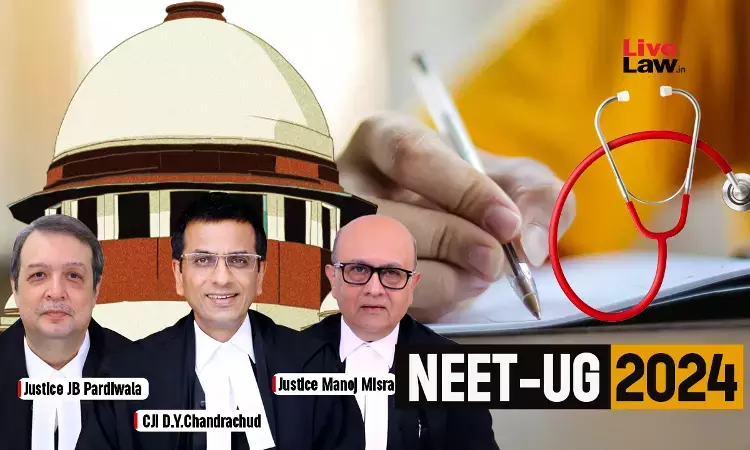The Supreme Court on Tuesday (July 23) refused to cancel the NEET-UG 2024 exam on the ground of paper leak and malpractices. The Court stated that there was no material to indicate that the leak was systemic affecting the sanctity of the entire exam.
The Court also stated that ordering a re-examination will lead to serious consequences affecting over 23 lakh students and will lead to disruption of the academic schedule, causing a cascading effect in the coming years.
While acknowledging that there was a paper leak in the centres in Hazaribag(Jharkhand) and Patna(Bihar), the Court said that sufficient material is absent on the record to lead to the conclusion that the results of the exam stand vitiated in its entirety or that there was a systemic breach in the sanctity of the exam.
The data produced on record is not indicative of the systemic leak of the question paper which would lead to the destruction of the sanctity of the exam, the Court stated.
A bench comprising Chief Justice of India DY Chandrachud, Justices JB Pardiwala and Manoj Misra passed the order in a batch of petitions seeking to cancel the National Eligibility-cum-Entrance Test(NEET) held for Under Graduate (UG) medical admissions on May 5, 2024 for paper leak and malpractices. The results were declared on June 4.
Court directs NTA to re-tally the results
The Court also disapproved of the decision of the NTA to treat two options as the correct answers for one question. Accepting the expert report submitted by an expert team constituted by IIT-Delhi regarding this ambiguous question, the Court stated that both options are mutually exclusive and cannot stand together.
Therefore, the Court directed that the option 4 should be treated as the correct answer and the NTA was asked to re-tally the results accordingly.
Conclusions of the Court:
The fact that a leak of the NEET-UG 2024 paper took place at Hazaribagh and at Patna is not in dispute.
Following the transfer of the investigation, CBI has filed its status reports. The disclosures by the CBI indicate that the investigation is continuing, however, it has indicated that the present material showed that about 155 students drawn from exam centres at Hazaribagh and Patna appeared to be beneficiaries of the scam.
Since the investigation by the CBI has not attained finality, the Court required the Union Govt to indicate if any abnormalities could be inferred from the results in 571 cities. The Union has produced a report of IIT Madras. The Court has independently scrutinized the data submitted by the NTA.
At the present stage, there is absence of material on the record sufficient to lead to the conclusion that the result of the exam stands vitiated or that there is a systemic breach in the sanctity of the exam.
The data produced on record is not indicative of the systemic leak of the question paper which would lead to the destruction of the sanctity of the exam.
The Court is also mindful of the fact that directing a fresh NEET-UG test for the present year would be replete with serious consequences for over 2 million students, including in particular – (1) disruption of the admission schedule, (2) cascading effects on the course of medical education, (3) prejudicial impact on the availability of qualified medical professionals in future, (4) serious element of disadvantage to the marginalised groups of students for whom reservations have been made in the allocation of seats.
The Court is guided by the well-settled test of the possibility of segregating the tainted from the untainted. Moreover, it is important to clarify that if the investigation reveals the involvement of an increased number of beneficiaries, action will be taken against them.
Arguments
The bench was told that the 50th percentile represents the cut-off for qualification. The examinations consists of 180 questions, each carrying four marks, making a total of 720 marks. One negative mark is assigned for wrong answers.
The 50th percentile has worked out to 164 marks out of 720. All candidates who have attained at least a threshold of 164 marks are thus qualified for being considered for admission.
The petitioners argued that the leak was systemic in nature and coupled with the structural deficiencies in the modalities of the exam, the only course of action permissible, in view of the precedents laid down by the Court in Tanvi Sarwal v. CBSE (2015), is to direct a re-test.
The Union and the National Testing Agency took the stand that the leak was localised in nature and that the beneficiaries are identifiable. The Union also cited a data analytics report prepared by the IIT-Madras which showed no abnormalities in the results or indication of any mass malpractice.
The Court pronounced the judgment this evening after hearing the matter for nearly four days. The Court clarified that a reasoned judgment will follow.

Aisha Patel is a dedicated Indian correspondent with a deep understanding of the nation’s diverse affairs. With a background in Indian culture, politics, and current events, she provides in-depth analysis and timely reporting on domestic issues within India.


